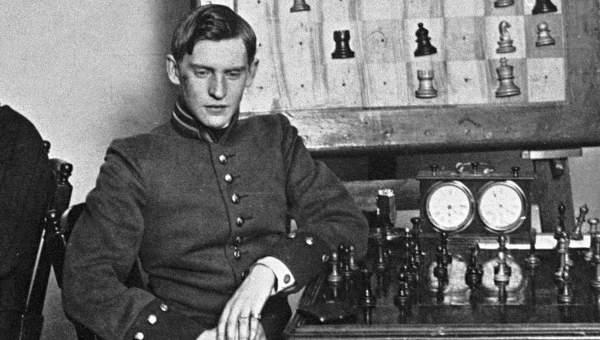
A new book on Alekhine
The Russian chess historian Sergey Voronkov has recently published a new book about Alexander Alekhine. The book is published in Russian language under the title "Russian Sphynx" and contains a wealth of material that either has not been published previously, or was buried in the obscure sources, such as the Russian-language newspapers published by the emigrants in Paris, Berlin or even Shanghai.

The book contains only 42 chess games (some of them not played by Alekhine but only briefly annotated by him) and yet it is quite a thick volume of 544 pages. Some of the materials in this book have been previously published as a series of articles on the Russian site ChessPro.ru. It is a very well written and highly addictive prose - I have received this book from the author a few weeks ago and read the biographical part in less than a week.
The ultimate goal of the author was to showcase the personality of the fourth World chess champion through Alekhine's own writing and through the first-hand observations of his acquaintances. I must say that it paints an ungainly picture, that of a man that was spoiled and egotistical already in his early teens. Alekhine's classmates remember him as someone who was distant and aloof, completely subsumed by chess and yet unpleasant and often downright rude in a real life.
It should not come as a surprise to anyone who read anything about Alekhine, but "Russian Sphynx" only goes to confirm that the man who has famously proclaimed "Through chess I developed my character" is probably the worst role model for anything outside of chess.
Another point about that I would like to make about this book is that the reader should not expect an end-to-end coverage of Alekhine's biography. Alekhine's life is too big of a subject to be exhaustively covered in a single volume. More importantly, there are already so many books and articles written about Alekhine life and games - starting from his own voluminous writing! - that it is reasonable to expect the average reader to know many of his famous games and to have a general idea of Alekhine's life arc. Hence this book mostly work at the margins, presenting documents, games and photos that are probably unfamiliar to the reader or that significantly change the existing narrative.
I believe that this is a reasonable assumption for Alekhine. I did not have this problem when writing a Smyslov biography - I could safely assume that the average reader would have only a vague idea of his life and games. However, Alekhine belongs to a different category - together with Capablanca, Tal or Fischer - that have always been immensely popular with the chess audience and that have dozens of books written about them already. However, it also presents a certain problem for the writers of the new books about these hallowed figures. One does not want to rehash the events and games that have been covered a hundred times and so the new books are often a patchwork of the recent historical discoveries and lesser-known facts.
Having said that, I must say that Voronkov does a great job in keeping the reader's attention. It does not hurt that Alekhine was a rather polarizing figure and that his biography had more twists and turns than a Hollywood movie.
However, I must say that what struck me most in the book was still Alekhine's chess. He had a unique talent for creating a total mess on the board, in which his immense tactical talent reigned supreme. It is especially clear in Alekhine's early games. He would often play second-rate openings, ignore the basic positional principles and yet when it came to the decisive moments, he would simply outsmart his opponents.
Forget opponents - even the annotators have a hard time figuring out Alekhine's combinations! Voronkov often updates the old commentary, but playing through the games I found a few holes in Voronkov's own analysis too.
For example, here is a fragment of the very first game published in a book. Alekhine played it by correspondence while still studying at school (p. 111 in the book):
I found another improvement in the annotations to the blindfold simul game that Alekhine played in Odessa in 1916 (p. 197 in the book):
The final correction was in a complex endgame that appeared in a match game that was played in Moscow in 1921 (p. 274 in the book):
Before we let go of this game, I would like to draw your attention to the final variation given by Voronkov:
What a fantastic position! White is a full queen up, he is to move and he can check the Black king... and yet it's a draw! Isn't chess amazing?
In my opinion, the position like the ones above are exactly what makes Alekhine's games so mesmerizing. He might have been a deeply flawed man but he was a true magician at the chess board.
I hope that the "Russian Sphynx" by Sergey Voronkov will be picked up by one of the Western chess publishing houses and translated into English sooner rather than later. It is certainly one of the most interesting chess books that I've read in a while.